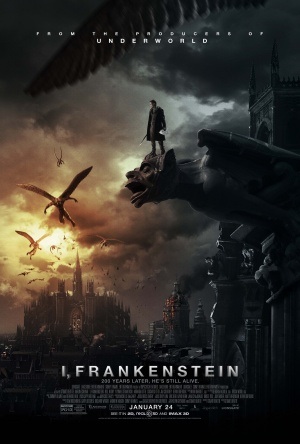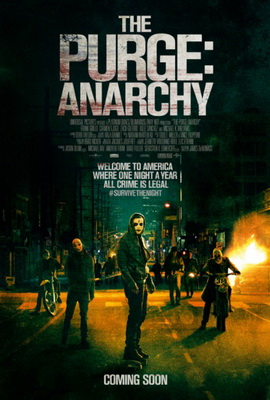As of right now, as far as I’m concerned, Guardians of the Galaxy is the best film of 2014.
Now please understand, I live in fly-over country and that means that there’s still quite a few films that I need to see. Next week and through the new year, I plan to see Foxcatcher, Inherent Vice, Into the Woods, Wild, and quite a few other films. And any one of those films could, potentially, become my new favorite of 2014.
But, as of right now, Guardians of the Galaxy is my favorite.
Of course, Guardians of the Galaxy is not the type of film that will ever get a major Oscar nomination. It’s unfairly dismissed as being pure entertainment or just a summer blockbuster. A few critics group have been nice enough to mention it but, for the most part, Guardians of the Galaxy is not the type of film that’s going to be given serious consideration for the big awards.
Except, of course, by me.
Below are ten reasons why I think Guardians of the Galaxy deserves serious consideration:
1) Never underestimate the importance of escapism.
Usually, when a film is described as being “escapist entertainment,” it’s a back-handed compliment. The implication is that the film may be entertaining but it has nothing to do with real world issues and therefore, it’s not as important as other films. We’re allowed to enjoy it but we’re supposed to feel guilty about it.
But you know what?
Sometimes, we need to be able to escape. That was certainly true this year. 2014 will not be remembered as a great year for humanity. From January to December, it’s been an endless parade of cruelty and intolerance. And no, we should never pretend that we live in a perfect world. We need to be aware of what’s happening outside of our own little corner of the world.
But that doesn’t mean that we haven’t earned the right to escape for 122 minutes. In fact, I would argue that 122 minutes of pure entertainment is something that we need to make time for if we are going to remain strong enough to face and perhaps change the realities of the world.
In short, when I walked out of the theater after watching Guardians of the Galaxy, I felt better than when I had first taken my seat. I felt happy. I felt enthusiastic. I felt ready to face this fucked up world of ours.
There is a place for pure, unadulterated escapism in cinema.
Not every film has to be a somber, self-important mess like Man of Steel.
Thank God.
2) The unappreciated subtext of Ronan
However, Guardians of the Galaxy is not pure escapism. Much as in this case of The Purge Anarchy and Capt. America: The Winter Soldier, there is a deeper subtext to the film. You just have to be willing to look for it.
One of the more frequent complaints about Guardians of the Galaxy is that the villain, Ronan (Lee Pace), isn’t particularly interesting and it is true that, when compared to Tom Hiddleston’s Loki or Iron Man’s villains, Ronan does seem to be a bit bland. His goals and his motivation are pretty simple. He destroys stuff and he kills people. Why? Because he’s the bad guy.
But, let’s take a closer look at Ronan. Ronan is a fanatic who believes that only his way is the correct way and only his beliefs are pure. Anyone who has different beliefs must be unpure and therefore, if they don’t agree to convert to his way of believing, Ronan is justified in destroying them.
Does that sound familiar to anyone?
For all the complaints that Ronan was a one-dimensional villain, the same can be said of Joseph Kony, Kim Jong-un, and Jihadi John, and Fred Phelps. The same can be said about a lot of evil people but that does not make them any less evil or dangerous. Ronan may be a simple villain but he’s also the type of villain that we can find all over the world.
The one thing that all Ronan-style fanatics have in common is a complete lack of imagination and humor. When Peter Quill stood up to Ronan by dancing, it was more than just a crowd-pleasing scene in a big action movie. It was a call-to-arms to not allow ourselves to be held hostage by the Ronans of the world. It was a plea to not let the fanatics among us steal our imagination and our right to find joy in our own individual way.
In short, it was a lesson that the entire world needs to learn.
3) I Am Groot
Yes, yes, I know. At this point, we’ve all had to listen to hundreds of friends, relatives, and strangers who have gotten it into their heads that they can perfectly imitate Vin Diesel saying, “I am Groot.” But, seriously — there’s a reason why everyone fell in love with that catch phrase and that’s because both Diesel and the film do more with those three words that most actors can do with a four-page monologue.
And if you didn’t tear up when you heard, “We are Groot,” then I’m sorry. You may be too cynical for your own good.
4) Introducing … James Gunn!
If you’ve read my review of Super or Arleigh’s review of Slither, then you know that James Gunn has long been a favorite of ours. One of the joys of the success of Guardians of the Galaxy has been watching him become a favorite of everyone else as well. And he deserves every bit of that success. Working within the confines of the summer blockbuster genre, Gunn has created a film that works as both a superior action movie and as a quirky comedy. With Guardians, James Gunn proved that it is possible to make a mainstream film without selling out your own individual style.
5) Introducing … Chris Pratt!
Even before he played Peter Quill, Chris Pratt was one of those actors who I have always been happy to see on screen. He just has such a naturally likable presence. But nothing he had done previously had prepared me for the pure joi de vivre that he brought to the role of Peter Quill. Whether he was trying to convince people to call him Star-Lord or hilariously attempting to “rally the troops” or daring Ronan to a dance-off, Chris Pratt was a joy to watch. If nothing else, Guardians of the Galaxy is the film that proves that Chris Pratt is a star (perhaps even a Star-Lord).
6) And let’s not forget Michael Rooker and Benicio Del Toro
Michael Rooker and Benicio Del Toro are both such quirky and unpredictable actors that I’m always happy to see either one of them on screen. Having both of them in one movie is even better. Rooker is perhaps the only actor alive who could not only be believable as a blue-skinned alien with an Alabama accent but who could also make that character into one of the most compelling in the film. As for Del Toro, I know that his defiantly eccentric performance was controversial but personally, I loved the strange energy he brought to all of his scenes.
7) And …. everyone else!
One thing that I really loved about Guardians of the Galaxy is that there were no wasted roles. Every character — from Peter to Zoe Saldana’s Gamora to John C. Reilly’s upright military guy to the people who only had a line or two — felt real. For a lot of viewers (including me), Rocket Raccoon (voiced by Bradley Cooper) was an easy favorite.
However, if I had to pick a best performance, I’d go with Dave Bautista as Drax. Bautista did so much with so little. As written, Drax is a physical dynamo with a need for revenge and absolutely no sense of humor. That’s a pretty standard character for a film like this. However, Bautista did so much with that character that poor, literal-minded Drax ultimately became one of the most intriguing characters in the film. My favorite Drax moment came when, in response to hearing that everything goes over his head, he explained that nothing could go over his head because he would reach up and grab it.
8) That soundtrack
I have to admit that I didn’t care as much for Interstellar as some people did. One of my big problems with the film came down to Hans Zimmer’s score. It was so loud and overbearing that I actually found myself covering my ears. But what really bothered me was how unnecessary it was. Whenever Matthew McConaughey or Anne Hathaway made a profound statement or the spaceship started to shake, the music would suddenly blast in my ear. It was like having Hans Zimmer in my head, repeatedly shouting, “IMPORTANT! IMPORTANT! EXCITING! EXCITING!”
BLEH!
And it made me appreciate how much I loved the soundtrack of Guardians of the Galaxy. By using songs that you would never expect to see in a science fiction epic, that soundtrack both mocked the genre’s natural tendency towards self-importance and also forced us to take another look at familiar scenes. From the minute Peter started dancing to Come and Get Your Love, I knew that I was watching a special movie.
9) The Prison Break
From planning to execution, this was without a doubt one of the best action sequences of the year. From Rocket laying out his overly complicated plan while Groot tries a much simpler method in the background to Peter asking for the guy’s leg to the use of The Pina Colada Song, this was a perfect scene.
10) And finally … Dancing Groot!
And those are just a few reasons why I think Guardians of the Galaxy is the best film I’ve seen this year so far.
(For a differing opinion, check out Ryan’s review here.)


















